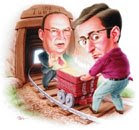 In the nice UQ physics colloquium that Tim Duty gave on friday he mentioned how when Josephson first proposed tunneling of supercurrents across an insulating barrier between two superconductors that John Bardeen (of BCS fame, and co-inventor of the transistor) vigorously opposed the idea. A beautiful article in Physics Today, "The Nobel Laureate vs. The Graduate Student," by D.G. McDonald reviews the history of this conflict.
In the nice UQ physics colloquium that Tim Duty gave on friday he mentioned how when Josephson first proposed tunneling of supercurrents across an insulating barrier between two superconductors that John Bardeen (of BCS fame, and co-inventor of the transistor) vigorously opposed the idea. A beautiful article in Physics Today, "The Nobel Laureate vs. The Graduate Student," by D.G. McDonald reviews the history of this conflict.The article shows several thoughts/observations
- through Anderson, Josephson learnt the importance of broken symmetry in condensed matter physics and understood its physical manifestations
- the Josephson effect results from quantum interference between two macroscopic quantum states (n.b., this was 30 years before such effects were seen with atomic BEC's)
- gauge invariance leads to extremely robust quantities such as quantised flux which are extremely fundamental and the basis of a "quantum" metrology
-it is ultimately experiment and not prestige, politics, or impassioned arguments which determine whether theories are ultimately accepted as true or false.




No comments:
Post a Comment